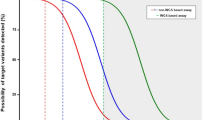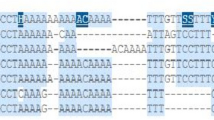Abstract
This study investigated the associations between genetic polymorphisms of six genes involved in DNA repair, detoxification pathways, and fluoropyrimidine metabolism and clinical outcomes in MGC patients receiving EOF treatment. This retrospective study included 108 Chinese MGC patients receiving EOF as first-line chemotherapy. Nine single nucleotide polymorphisms (SNPs) of six genes (ERCC1 rs2298881, ERCC2 rs13181 and rs1799793, XRCC1 rs25487 and rs25489, GSTP1 rs1695, GSTT1 rs2266637, and MTHFR rs1801133 and rs1801131) were genotyped, and the associations between each SNP and clinical outcome were analyzed. XRCC1 rs25487 A allele was significantly associated with progression disease (PD) to EOF (p = 0.002), and patients with AA genotype had significantly poorer progression-free survival (PFS) (p = 0.001) and overall survival (OS) (p = 0.041) compared with patients with the G allele (GG + GA). ERCC2 rs13181 G allele was significantly associated with PD (p = 0.026), and G carriers (GG + GT) tended to have poorer PFS (p = 0.092) than TT homozygotes. ERCC2 rs1799793 GA genotype was associated with unfavorable PFS (p = 0.034) and a tendency toward poorer OS (p = 0.090) compared with GG homozygotes. Patients were categorized as either good (0 risk factors) or poor risk (≥1 unfavorable SNPs) using a prognostic index based on XRCC1 rs25487 AA, ERCC2 rs13181 (GG + GT), and ERCC2 rs1799793 GA genotypes, with median OS and PFS of 534 days, 281 days (p = 0.009) and 206 days, and 123 days (p < 0.001), respectively. These results suggest that the prognostic index comprising XRCC1 rs25487, ERCC2 rs13181, and rs1799793 polymorphisms may be a useful predictor of clinical outcomes in MGC treated with EOF.


Similar content being viewed by others
References
Jemal A, Bray F, Center MM, Ferlay J, Ward E, Forman D. Global cancer statistics. CA: Cancer J Clin. 2011;61(2):69–90. doi:10.3322/caac.20107.
Van Cutsem E, Moiseyenko VM, Tjulandin S, Majlis A, Constenla M, Boni C, et al. Phase III study of docetaxel and cisplatin plus fluorouracil compared with cisplatin and fluorouracil as first-line therapy for advanced gastric cancer: a report of the V325 Study Group. J Clin Oncol : Off J Am Soc Clin Oncol. 2006;24(31):4991–7. doi:10.1200/JCO.2006.06.8429.
Weng L, Zhang L, Peng Y, Huang RS. Pharmacogenetics and pharmacogenomics: a bridge to individualized cancer therapy. Pharmacogenomics. 2013;14(3):315–24. doi:10.2217/pgs.12.213.
Reed E. ERCC1 and clinical resistance to platinum-based therapy. Clin Cancer Res : Off J Am Assoc Cancer Res. 2005;11(17):6100–2. doi:10.1158/1078-0432.CCR-05-1083.
Faivre S, Chan D, Salinas R, Woynarowska B, Woynarowski JM. DNA strand breaks and apoptosis induced by oxaliplatin in cancer cells. Biochem Pharmacol. 2003;66(2):225–37.
Weaver DA, Crawford EL, Warner KA, Elkhairi F, Khuder SA, Willey JC. ABCC5, ERCC2, XPA and XRCC1 transcript abundance levels correlate with cisplatin chemoresistance in non-small cell lung cancer cell lines. Mol Cancer. 2005;4(1):18. doi:10.1186/1476-4598-4-18.
Gurubhagavatula S, Liu G, Park S, Zhou W, Su L, Wain JC, et al. XPD and XRCC1 genetic polymorphisms are prognostic factors in advanced non-small-cell lung cancer patients treated with platinum chemotherapy. J Clin Oncol : Off J Am Soc Clin Oncol. 2004;22(13):2594–601. doi:10.1200/JCO.2004.08.067.
Abdel-Rahman SZ, El-Zein RA. The 399Gln polymorphism in the DNA repair gene XRCC1 modulates the genotoxic response induced in human lymphocytes by the tobacco-specific nitrosamine NNK. Cancer Lett. 2000;159(1):63–71.
Wang D, Lippard SJ. Cellular processing of platinum anticancer drugs. Nat Rev Drug Discov. 2005;4(4):307–20. doi:10.1038/nrd1691.
Goto S, Iida T, Cho S, Oka M, Kohno S, Kondo T. Overexpression of glutathione S-transferase pi enhances the adduct formation of cisplatin with glutathione in human cancer cells. Free Radic Res. 1999;31(6):549–58.
Townsend DM, Tew KD. The role of glutathione-S-transferase in anti-cancer drug resistance. Oncogene. 2003;22(47):7369–75. doi:10.1038/sj.onc.1206940.
Booton R, Ward T, Heighway J, Ashcroft L, Morris J, Thatcher N. Glutathione-S-transferase P1 isoenzyme polymorphisms, platinum-based chemotherapy, and non-small cell lung cancer. J Thoracic Oncol : Off Public Int Assoc Stud Lung Cancer. 2006;1(7):679–83.
Ueland PM, Hustad S, Schneede J, Refsum H, Vollset SE. Biological and clinical implications of the MTHFR C677T polymorphism. Trends Pharmacol Sci. 2001;22(4):195–201.
Toffoli G, De Mattia E. Pharmacogenetic relevance of MTHFR polymorphisms. Pharmacogenomics. 2008;9(9):1195–206. doi:10.2217/14622416.9.9.1195.
Marcuello E, Altes A, Menoyo A, Rio ED, Baiget M. Methylenetetrahydrofolate reductase gene polymorphisms: genomic predictors of clinical response to fluoropyrimidine-based chemotherapy? Cancer Chemother Pharmacol. 2006;57(6):835–40. doi:10.1007/s00280-005-0089-1.
Wang Z, Chen JQ, Liu JL, Qin XG, Huang Y. Polymorphisms in ERCC1, GSTs, TS and MTHFR predict clinical outcomes of gastric cancer patients treated with platinum/5-Fu-based chemotherapy: a systematic review. BMC Gastroenterol. 2012;12:137. doi:10.1186/1471-230X-12-137.
Huang ZH, Hua D, Li LH. The polymorphisms of TS and MTHFR predict survival of gastric cancer patients treated with fluorouracil-based adjuvant chemotherapy in Chinese population. Cancer Chemother Pharmacol. 2009;63(5):911–8. doi:10.1007/s00280-008-0815-6.
Weisberg I, Tran P, Christensen B, Sibani S, Rozen R. A second genetic polymorphism in methylenetetrahydrofolate reductase (MTHFR) associated with decreased enzyme activity. Mol Genet Metab. 1998;64(3):169–72. doi:10.1006/mgme.1998.2714.
Geng R, Chen Z, Zhao X, Qiu L, Liu X, Liu R, et al. Oxidative stress-related genetic polymorphisms are associated with the prognosis of metastatic gastric cancer patients treated with epirubicin, oxaliplatin and 5-fluorouracil combination chemotherapy. PLoS One. 2014;9(12):e116027. doi:10.1371/journal.pone.0116027.
Shi YY, He L. SHEsis, a powerful software platform for analyses of linkage disequilibrium, haplotype construction, and genetic association at polymorphism loci. Cell Res. 2005;15(2):97–8. doi:10.1038/sj.cr.7290272.
Tregouet DA, Garelle V. A new JAVA interface implementation of THESIAS: testing haplotype effects in association studies. Bioinformatics. 2007;23(8):1038–9. doi:10.1093/bioinformatics/btm058.
Lu ZM, Luo TH, Nie MM, Fang GE, Ma LY, Xue XC, et al. Influence of ERCC1 and ERCC4 polymorphisms on response to prognosis in gastric cancer treated with FOLFOX-based chemotherapy. Tumour Biol : J Int Soc Oncodev Biol Med. 2014;35(4):2941–8. doi:10.1007/s13277-013-1378-7.
Huang ZH, Hua D, Du X. Polymorphisms in p53, GSTP1 and XRCC1 predict relapse and survival of gastric cancer patients treated with oxaliplatin-based adjuvant chemotherapy. Cancer Chemother Pharmacol. 2009;64(5):1001–7. doi:10.1007/s00280-009-0956-2.
Liu B, Wei J, Zou Z, Qian X, Nakamura T, Zhang W, et al. Polymorphism of XRCC1 predicts overall survival of gastric cancer patients receiving oxaliplatin-based chemotherapy in Chinese population. Europ J Human Genet : EJHG. 2007;15(10):1049–53. doi:10.1038/sj.ejhg.5201884.
Xu J, Ma J, Zong HT, Wang SY, Zhou JW. Pharmacogenetic role of XRCC1 polymorphisms on the clinical outcome of gastric cancer patients with platinum-based chemotherapy: a systematic review and meta-analysis. Genet Molec Res : GMR. 2014;13(1):1438–46. doi:10.4238/2014.March.6.2.
Sacerdote C, Guarrera S, Ricceri F, Pardini B, Polidoro S, Allione A, et al. Polymorphisms in the XRCC1 gene modify survival of bladder cancer patients treated with chemotherapy. Int J Cancer J Int Cancer. 2013;133(8):2004–9. doi:10.1002/ijc.28186.
Banescu C, Duicu C, Trifa AP, Dobreanu M. XRCC1 Arg194Trp and Arg399Gln polymorphisms are significantly associated with shorter survival in acute myeloid leukemia. Leukemia Lymp. 2014;55(2):365–70. doi:10.3109/10428194.2013.802781.
Lunn RM, Helzlsouer KJ, Parshad R, Umbach DM, Harris EL, Sanford KK, et al. XPD polymorphisms: effects on DNA repair proficiency. Carcinogenesis. 2000;21(4):551–5.
Yin M, Yan J, Martinez-Balibrea E, Graziano F, Lenz HJ, Kim HJ, et al. ERCC1 and ERCC2 polymorphisms predict clinical outcomes of oxaliplatin-based chemotherapies in gastric and colorectal cancer: a systemic review and meta-analysis. Clin Cancer Res : Off J Am Assoc Cancer Res. 2011;17(6):1632–40. doi:10.1158/1078-0432.CCR-10-2169.
Giovannetti E, Pacetti P, Reni M, Leon LG, Mambrini A, Vasile E, et al. Association between DNA-repair polymorphisms and survival in pancreatic cancer patients treated with combination chemotherapy. Pharmacogenomics. 2011;12(12):1641–52. doi:10.2217/pgs.11.109.
Chu H, Gu D, Xu M, Xu Z, Gong Y, Gong W, et al. A genetic variant in ERCC2 is associated with gastric cancer prognosis in a Chinese population. Mutagenesis. 2013;28(4):441–6. doi:10.1093/mutage/get023.
Li Y, Liu Z, Liu H, Wang LE, Tan D, Ajani JA, et al. ERCC1 and ERCC2 variants predict survival in gastric cancer patients. PLoS One. 2013;8(9):e71994. doi:10.1371/journal.pone.0071994.
Qiu M, Yang X, Hu J, Ding X, Jiang F, Yin R, et al. Predictive value of XPD polymorphisms on platinum-based chemotherapy in non-small cell lung cancer: a systematic review and meta-analysis. PLoS One. 2013;8(8):e72251. doi:10.1371/journal.pone.0072251.
Ruzzo A, Graziano F, Kawakami K, Watanabe G, Santini D, Catalano V, et al. Pharmacogenetic profiling and clinical outcome of patients with advanced gastric cancer treated with palliative chemotherapy. J Clin Oncol : Off J Am Soc Clin Oncol. 2006;24(12):1883–91. doi:10.1200/JCO.2005.04.8322.
Xu Z, Zhu H, Luk JM, Wu D, Gu D, Gong W, et al. Clinical significance of SOD2 and GSTP1 gene polymorphisms in Chinese patients with gastric cancer. Cancer. 2012;118(22):5489–96. doi:10.1002/cncr.27599.
Frosst P, Blom HJ, Milos R, Goyette P, Sheppard CA, Matthews RG, et al. A candidate genetic risk factor for vascular disease: a common mutation in methylenetetrahydrofolate reductase. Nat Genet. 1995;10(1):111–3. doi:10.1038/ng0595-111.
Yu H, Wu X, Zhang Y, Jin Z, Li G, Zhao H. Genetic variability of DNA repair mechanisms influences chemotherapy outcome of gastric cancer. Int J Clin Experiment Pathol. 2015;8(4):4106–12.
Chu HY, Gu DY, Xu M, Xu Z, Gong YL, Gong WD, et al. A genetic variant in ERCC2 is associated with gastric cancer prognosis in a Chinese population. Mutagenesis. 2013;28(4):441–6. doi:10.1093/Mutage/Get023.
Hu ZB, Ma HX, Chen F, Wei QY, Shen HB. XRCC1 polymorphisms and cancer risk: a meta-analysis of 38 case–control studies. Cancer Epidem Biomar. 2005;14(7):1810–8. doi:10.1158/1055-9965.Epi-04-0793.
Li GN, Li XM, Liu YQ, Bao ZQ, Yang LX, Wang X, et al. Association between glutathione S-transferases M1 and T1 gene polymorphisms and esophageal cancer prognosi. Int J Clin Experiment Med. 2015;8(3):3300–8.
Cecchin E, Perrone G, Nobili S, Polesel J, De Mattia E, Zanusso C, et al. MTHFR-1298 A > C (rs1801131) is a predictor of survival in two cohorts of stage II/III colorectal cancer patients treated with adjuvant fluoropyrimidine chemotherapy with or without oxaliplatin. Pharmacogenom J. 2015;15(3):219–25. doi:10.1038/tpj.2014.64.
Acknowledgments
The authors thank Wenyuan Zhu and Yan Yan for their help in data selection. This work supported by the Natural Science Foundation of Shanghai (Grant No. 13ZR1408200) and Foundation of the Shanghai Municipal Science and Technology Commission (Grant No. 134119a8600).
Compliance with ethical standards
The study was conducted complying with the principles of the Helsinki Accord, and informed consent was obtained from each patient.
Conflicts of interest
None
Author information
Authors and Affiliations
Corresponding author
Additional information
Rujiao Liu and Xiaoying Zhao contributed equally to this work.
Rights and permissions
About this article
Cite this article
Liu, R., Zhao, X., Liu, X. et al. Influences of ERCC1, ERCC2, XRCC1, GSTP1, GSTT1, and MTHFR polymorphisms on clinical outcomes in gastric cancer patients treated with EOF chemotherapy. Tumor Biol. 37, 1753–1762 (2016). https://doi.org/10.1007/s13277-015-3935-8
Received:
Accepted:
Published:
Issue Date:
DOI: https://doi.org/10.1007/s13277-015-3935-8




